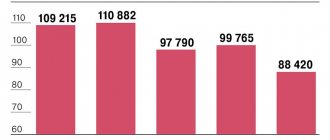Colorado's Experience with Marijuana Legalization
A rather paradoxical situation has developed in the USA. At the federal level, the sale of “weed” is strictly prohibited. The then President of the country Barack Obama made a statement that the decision on legalization should be made by each state independently. At the same time, the federal government will not oppose the decision of local authorities in any way. Today, Colorado is a kind of testing ground. If the experience of this state is considered positive, legalization has every chance to eventually spread throughout the country.
In essence, the legalization of marijuana trade is a capitulation of the principle of zero tolerance. It was proclaimed back in 1971 by President Richard Nixon. Then a complete ban on the use, storage and distribution of cannabis was introduced.
a trillion dollars flushed down the toilet
For 42 years the United States followed the established principle. Over one trillion dollars has been spent on the fight against weed. Now we can safely say that these funds were wasted.
As a result of the tough fight against drugs, the number of drug addicts has not decreased. On the contrary, their number has only increased. The quality of the “grass” has improved. In addition, it has become much more accessible to ordinary citizens. As a result of the process of complete criminalization of the cannabis trade, the country has taken first place in the world in terms of the number of prisoners.
During the 42 years of the merciless fight against marijuana, more than 40 million people were imprisoned in US prisons, convicted of various drug-related offenses. In addition to the social problem, this also created a serious burden on the country's budget. Maintaining such a number of prisoners is not cheap.
The criminalization of the cannabis trade has contributed to an increase in crime in general. Wars between drug traffickers for markets have led to many murders and other crimes. As a result, instead of improving the crime situation in the country, the opposite process occurred.
The cannabis trade has become a profitable, albeit dangerous, business. Young people from poor families began to actively get involved in this profitable business. Many of them saw it as their only chance to make a “career” and get rich. As a result, leading American analysts came to the conclusion that an all-out fight against the weed trade:
- an extremely expensive task;
- creates a lot of social problems;
- ineffective and useless.
As a result, the United States decided to change strategy. It was decided to try to curb the weed trade for the benefit of the country.
After the announcement of legalization in Colorado, many analysts made rosy predictions. It was expected that the decriminalization of the sale and use of cannabis would lead to a reduction in the number of prisoners. A huge percentage of those convicted were people convicted of smoking drugs. It was predicted that legalization would allow the police to concentrate on investigating more serious crimes than catching pot addicts. It was also estimated that Colorado would save about $40 million per year. And the state's direct revenue could rise to $400 million annually. At the same time, analysts said that the legalization of “weed” throughout the country would attract about $2.5 billion to the US budget.
Another expected consequence was the collapse of the drug mafia and a significant reduction in related crimes. Note that this is a long-term forecast. In 2014, there were only 24 cannabis stores in all of Colorado.
Negative forecasts were also voiced. Opponents of legalization argued that the entire state would turn into one big coffee shop. At the same time, the number of weed smokers will increase significantly, and Colorado will become overcrowded with drug addicts who will come from all over the country.
Find out how to cure addiction! Talk to a narcologist right now
Every state could legalize marijuana by 2022
Investors interested in seeking profit from marijuana do not have many investment options available. Most bank shares that investors can buy are traded on the unregulated over-the-counter market, which exposes investors to significant risk of fraud.
Investors expressed growing optimism about General Mills' (NYSE: GIS) third-quarter financial report. The snacks and cereals giant has been struggling with major shifts in demand in its core packaged food business, but its latest earnings announcement contained weak signs of a rebound in construction. In its business update this week, the company again delivered impressive financial results that helped it exceed most investors' expectations. However, sales volumes were insufficient, resulting in slower growth Read more.
The medical and recreational marijuana market is growing rapidly as legislators in most states pass laws to legalize it. Already, 28 states have medical marijuana laws, and eight states have also passed recreational marijuana laws. According to the latest research from GreenWave Advisors, these numbers are set to rise significantly.
Another intriguing way to gain access to the marijuana market. The company generates 90% of its sales in the United States, and management projects sales growth of 4-5% year over year this fiscal year. Part of the increase is due to increased demand from marijuana growers. Hydroponics has become the company's core business, and a number of acquisitions allow it to capitalize on this market. In 2015, it acquired General Hydroponics for $130 million, and in 2016 it acquired 75% of Gavita, a growing lighting and equipment company, for $136 million. It also acquired Arizona-based Botanicare for $93 million and invested in Colorado indoor growing company AeroGrow.
Wednesday was a relatively quiet day on Wall Street, with major benchmarks remaining close to unchanged levels as market participants took a break from the events of the past few weeks. Investors in the energy arena were optimistic about the future, sending crude oil prices higher by about $1 a barrel to rise above $49 Read more.
Were your hopes justified?
After 3 years, we can sum up the first results of legalization in Colorado. Let us say right away that the negative forecasts turned out to be wrong. The state has not become like the capital of Holland, where coffee shops for weed lovers are open on every corner.
Cannabis can only be sold in licensed retail outlets. However, drug use is permitted exclusively at home, and only with the permission of the homeowner.
Only persons over 21 years of age can purchase weed. However, the maximum weight of the purchased product is only one ounce. Such rules apply only to persons who have a passport issued within the state. Citizens from other regions of the country have the right to buy a quarter of the specified amount of cannabis.
The number of purchases per day is in no way unlimited. However, you are allowed to store no more than one ounce. The law allows you to share the drug with friends, but reselling weed is prohibited. In addition, state residents can grow marijuana at home. This can only be done in an inaccessible and well-protected place from outsiders.
It should be noted that trade in cannabis for medical and recreational purposes is regulated by different permits. If a dealer runs out of “weed” for one purpose, he does not have the right to sell marijuana intended for another purpose by simply changing the labels on the product.
Statistics from the Department of State Revenues report that in March 2014 alone, shops selling “weed” earned over nineteen million dollars. Moreover, a month earlier the amount was 5 million less. In the first 90 days after legalization of cannabis sales, the state treasury received more than $7 million. State authorities used the funds received to finance schools, child care institutions and various educational programs that explain to citizens how to properly handle and use marijuana.
Over the past time, we can confidently say that the “weed” trade is thriving. Immediately, the increase in sales was associated with the effect of novelty. However, it is already clear that this is not entirely true. Some companies were even looking to sell vacation packages to Colorado. However, the Department of Tourism did not find this idea attractive. Nobody wants a state to be associated solely with the ability to freely smoke weed.
Entire educational hubs have been opened throughout the state, where everyone is taught the legal trade in marijuana. A lot of vacancies related to this type of business have appeared on local labor exchanges. For example, you can find advertisements seeking sales consultants, farmers and journalists. To work in this area you need to obtain a special permit. Note that today the process of obtaining a license is quite complex and confusing. To obtain a permit to work in the cannabis trade, you need to make many visits to the authorities supervising this activity.
The data on the crime situation is also quite optimistic. In the first few months alone, the state's homicide rate dropped by a record 66 percent. At the same time, the number of criminal cases related to the illegal trafficking of “weed” has become even smaller. It is too early to draw far-reaching conclusions. But it is clear that the state has not become more crime-prone because marijuana has become legal and more accessible.
Businessmen from Russia enter the legal marijuana market
Many invest in this market as private individuals, but prefer to remain private, several people said. The illegal status of cannabis at the international level and in Russia carries reputational risks for investors and problems with banks in many countries. For a businessman with a Russian passport and living in Russia, the safest way to invest in a project in the cannabis market is to buy shares of a publicly traded company. But even this does not guarantee a lack of attention from law enforcement agencies and bank departments monitoring that money is not involved in the financing of illegal operations, complains a lawyer for one of the venture funds.
In the US, it is currently illegal to transport cannabis from state to state (if you cross the border, federal legislation starts to apply, making weed illegal), and there are not enough experts in the field of regulation and obtaining the right licenses, Bellow adds.
Existing problems
According to state law, a driver who is under the influence of marijuana will be fined. The decision is made based on the test. If five nanograms of the active substance are found in the driver’s blood, you will have to fork out the money. It is noted that for many people, the level of marijuana content drops below this figure within 3 hours after consuming the drug.
Analysts admit that the law under consideration is not ideal. Local authorities are well aware that the punishment system must work more effectively. Otherwise, federal officials may intervene. Therefore, the state leadership strives to stick to the “golden mean”. It is important for them that all parties are satisfied with the state of affairs, and that the people who voted in the referendum on legalization do not regret their decision.
An unexpected factor was the appearance of food products containing a narcotic substance.
The production of cookies, chocolate and other delicacies has been established. The first call occurred when a fourth-grade student in one of the state’s cities tried to sell sweets containing cannabis to his peers.
A case became widely known when a second-year student at one of the universities ate a cake with marijuana, after which the guy jumped from the balcony of his house. Proponents of legalization react harshly to such situations, and always state that they fully support the implementation of strict supervision of food products containing cannabis. Including restrictions on the type and shape of packaging and the content of the narcotic substance.
Post-legalization polls show that more than half of local residents support the legalization of cannabis. Many of them argue that, by and large, nothing has changed. Besides the fact that now lovers of “weed” can use it openly.
The world's first cannabis church
4 months after the legalization of marijuana in Denver, an extraordinary event occurred. The world's first International Church of Cannabis was opened in the city. The discovery took place in a building that previously belonged to a Protestant church.
Adherents of the new religion call themselves evolutionists. Supporters of the new cult believe that through the use of cannabis they know God and improve themselves. Within the walls of the “temple,” lovers of “weed” intend to use it for ritual purposes.
The opening of the church took place on a significant date for all marijuana smokers - April 20. This is an interpretation of the 4/20 notation. It is believed that 4:20 am is the best time to consume cannabis.
The “temple” itself was designed by the famous artist Okuda San Miguel. The interior of the room is decorated with various graffiti in a rather variegated color scheme. Many people joke and say that only those who are “smoked” can calmly perceive wall decoration in an “eye-opening” format.
The founder of the religious organization was Steve Burke. He also heads one of the companies that markets legal cannabis in the state market. Moreover, the guy does not hide the fact that he created a church to promote his business.
How are things going in Russia with the legalization of cannabis?
Russian legislation regarding cannabis looks softer against the backdrop of the American principle of zero tolerance. Although this point is quite controversial. In Russia, “grass” is included in the list of prohibited substances. Administrative liability is provided for the acquisition, transportation and storage of marijuana. A dope lover can be fined from 500 to 1000 rubles, or receive arrest for up to 15 days.
The severity of the punishment directly depends on the weight of the detected narcotic substance. A significant amount is considered to be 6 grams of marijuana or 2 grams of hashish. Let us remind you that in America the legal dose is 28 grams.
The Russian law enforcement system is nostalgic for the times of the Soviet Union. In those days, you could get 7 years in prison for using “weed.” A system of so-called LTPs also worked. In these institutions, people addicted to alcohol or drugs were subjected to forced treatment. Conditions of detention in the LTP were similar to those in prison. Naturally, the number of “cured” people was negligible.
Supporters of tougher responsibility propose to practically revive the Soviet system of combating drugs. It is proposed to significantly tighten penalties for cannabis-related offenses. For example, there was an initiative to give people caught with weed a second time 3 years in prison or send them to compulsory treatment. Anti-drug activists believe that criminal liability will be a good deterrent for young people. Many teenagers do not risk starting to use “weed,” knowing that they could go to jail for it.
Scale of the problem
According to available statistics, the number of alcoholics in our country exceeds 5 million people. At the same time, there are 8 times more smokers - 44 million. This is about 40% of the country's population. Approximately 8.5 million Russians use various drugs. And this is almost 6% of the population of the Russian Federation.
Today, Russia has practically become the leader in the number of drug addicts. Every third crime is somehow related to drug trafficking. All this indicates that the situation is quite deplorable, and drastic measures are needed to combat this negative phenomenon.
How can it be useful for the environment?
For comparison in terms of environmental friendliness. 1 hectare of hemp produces the same amount of oxygen and absorbs carbon dioxide as 4 (four!) hectares of deciduous forest. But a forest takes 20 years to grow, and hemp takes 2 months. Unfortunately, I cannot provide any data on how many resources and time it takes to cut down and process 4 hectares of forest and 1 hectare of hemp, but I think you have some analytical skills and are able to estimate these scales without such data.
Also, I will not be able to provide any data on how many chemicals and poisons will be used and released into the atmosphere when processing 4 hectares of forest, but I can say that for the processing and production of something from 1 hectare of hemp, most likely, no chemicals will be needed .
Legalize in Russia: pros and cons
In our country, the problem of marijuana is treated differently. There are many supporters of legalization in Russia. For example, a petition was created to the President of the Russian Federation, which called for legalizing the use and sale of the drug.
Proponents of legalization cite various arguments to support their case. In particular, they claim that, according to studies conducted in different countries of the world, cannabis is much less harmful than alcohol. Examples of the use of cannabis for medicinal purposes are also given. Cannabis use has been proven to help seriously ill people cope with severe pain. In some cases, cannabis is used as a means to combat depression and severe stress.
An example is the experience of countries in which cannabis has been partially or completely decriminalized. It is argued that the lifting of the ban did not lead to a rapid increase in drug addiction, and in some cases it gave the exact opposite effect.
Proponents of legalization argue that prohibiting the possession and use of marijuana is a source of police corruption. Many unscrupulous police officers themselves are involved in protecting the drug trade. In addition, the presence of criminal liability breaks the fate of many young people who end up in prison for using “weed.”
Instead of a “natural product,” many cannabis lovers buy various semi-legal smoking mixtures, which are similar in effect to hemp. However, they are much more harmful. The infamous "spice" regularly causes accidents and serious crimes. Reference is also made to studies confirming that cannabis is much less harmful than alcohol and tobacco, which are freely sold in every store.
The creators of the petition for legalization are calling for the creation of a special commission. Its task should be a comprehensive and unbiased study of all aspects related to marijuana in one way or another.
Opponents of the legalization of “dope” argue that foreign experience is not universal and will not work in Russia. For example, alcohol and tobacco are freely sold. And this does not in any way reduce the number of smokers and alcoholics. On the contrary, every year there are only more of them.
If “weed” is sold as freely as alcoholic beverages and cigarettes, this will lead to a serious increase in drug addiction. The “novelty effect” will motivate even those people who previously avoided it to start using the drug.
Another argument is the lack of consumer culture. If drunkenness is a huge problem in our country, then most likely the situation with smoking weed will be the same. It is difficult to imagine that the majority of Russians will limit themselves to moderate cannabis use, and exclusively during non-working hours.
What is this?
This is my old creation. Somehow I came across a link that I had left in many places on the topic for educational purposes and was surprised to discover that the valiant editors of the yvision.kz platform, on which my old blogger has lived for a long time, for some reason cut out this article from there. And now the link shows 404. But I still respect my work a little, and I’m not ready for SUCH content to sink into oblivion because of censorious censorship or whatever. I decided to restore it here, where there is no censorship.
The post does not promote the use and distribution of prohibited substances, so I was doubly perplexed as to why it was deleted. And without any warnings or notifications. So, below is the original article with comments from readers. Was written and published on May 13, 2015.
To be or not to be?
Currently, marijuana is strictly prohibited in Russia. Administrative liability is established for possession of less than 6 grams of the drug and cultivation of less than 20 cannabis bushes. In other cases, criminal liability arises.
It is important to understand that properly organized tough measures to combat the spread of drugs can significantly reduce the scale of the problem. Often supporters of legalization cite as an example the allegedly negative experience of the “prohibition” adopted in the Soviet Union. However, if we study this experience in detail, a completely different picture emerges.
During the period of Prohibition, the number of alcoholics in the country decreased significantly. At the same time, the number of crimes committed while intoxicated has been steadily decreasing. Fear of punishment demotivates many people to drink alcohol. The same effect can be achieved in the case of marijuana.
Do not forget that “weed” is the first step to more serious drugs. Most drug addicts started with marijuana. Then, in search of stronger sensations, they switched to stronger substances.
The statement “weed is not a drug” does not stand up to scrutiny. Cannabis does not affect everyone's body the same way. Some citizens are predisposed to drug addiction and may quickly become addicted to cannabis if it becomes more accessible. To get rid of addiction you will have to undergo long-term and not always effective treatment.
Based on the above, we can conclude that issues of availability of marijuana must be approached with extreme caution and attention. Do not forget that “weed” is not vitamins, but a narcotic substance that is harmful to health and is addictive.
The State Duma adopted a law on growing marijuana for medical purposes - latest news
Sometimes a Russian court replaces this payment with confiscation of the convicted person’s income for up to 2 years. The offender can be punished with correctional labor for a period of up to 480 hours or have his freedom restricted with the obligation to visit law enforcement agencies monthly to check in with the local police officer. Real imprisonment under this part is applied in the presence of other conflict situations with the law, and the period of isolation under this article can reach up to 2 years.
The specificity of this point is that if the size is not large, then there will also be no corpus delicti. In addition, there are also such qualifying features as: a group of previously agreed persons, an organized group, especially large size.
A high-profile bill on the legalization of the cultivation of plants containing narcotic substances for medical purposes was adopted by the State Duma of the Russian Federation on June 20, 2022 in the third reading. This law lifts the current ban on growing marijuana (cannabis) and poppy, but not for everyone. Only state enterprises (federal state unitary enterprises) that have the appropriate license for this type of activity will be able to cultivate plants. There are only 2 such enterprises in Russia so far. Thus, the law on growing marijuana in Russia in 2022 establishes a state monopoly on this type of activity.
For example, soporific poppy is often grown in private homes. And it’s teenagers who do this. But if this does not happen on a large scale, then the act will not be qualified under Art. 231, a case will not be opened, and persons will not be held criminally liable.
On June 20, bill No. 621437-7 “On amendments to the Federal Law “On Narcotic Drugs and Psychotropic Substances” in terms of improving the procedure for cultivating narcotic plants” was adopted in the third reading. Now he will have to be approved by the Federation Council and receive the signature of the President of the Russian Federation. There is no doubt that this will happen in the near future. After that, the 2022 Marijuana Cultivation Act will go into effect. Read the official text of the law and the explanatory note to it later in the article.
You can “puff” without any problems in many US states, for example, Colorado, Washington or Massachusetts. Bangladesh, Uruguay, some regions of India, Canada - in all these places the use is quite free, albeit with restrictions (up to 30 grams per person in Canada, for example). And that’s not counting the many countries where it seems like you can’t buy anything openly, but no one will do anything if you’re caught smoking a joint. Yes, the distributor may get something, but the ordinary “user” will go unpunished.







